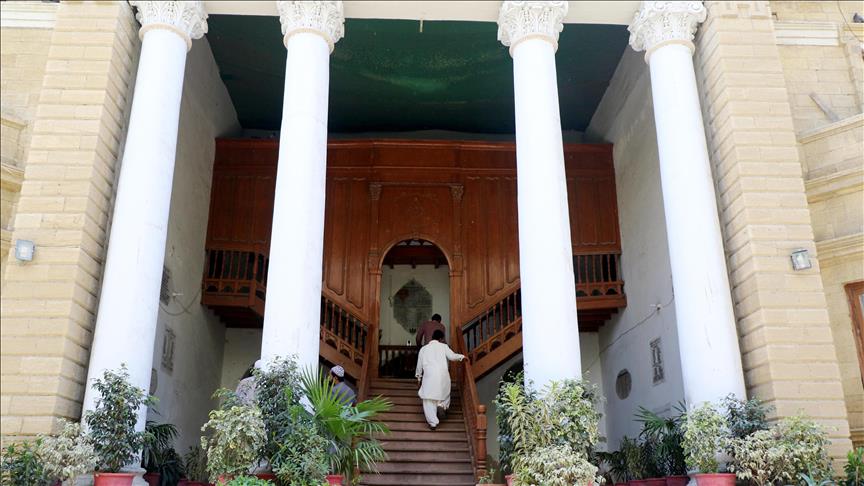Colonial building in Pakistan keeps Freemason past
Government office building in downtown Karachi once served as local headquarters for Freemasons, historians say

By Aamir Latif
KARACHI, Pakistan
An early 20th-century building in Pakistan's largest city and commercial capital Karachi is said to have once served as the local headquarters of the secret Freemason Society.
The society, with its own symbols and rites, dates back to the early 18th century. Its members reportedly included some of the most important men in history including George Washington, the first U.S. president, Benjamin Franklin, America's founding father, Mark Twain, a renowned novelist, and Winston Churchill, former British prime minister.
The entrance to the Edwardian era stone structure is guarded by two policemen. A handful of weary pigeons rest at its square-edged pillars. A canopy of trees in the grounds offers some peace in the otherwise bustling downtown.
The Lodge Hope, as it is officially known, was built in 1914. For several years it served as the hub of literary and social
Currently, the building, which was declared a national heritage site in 2008, is being used as the office of the wildlife department of Sindh province for which Karachi serves as the capital.
A large airy room, which once served as the bar, has been converted into the office of an assistant director for the department. A dining hall has been converted into a museum -- though it does not display anything which bears testimony to the building's celestial past.
The kitchen serves as a storeroom.
Surprisingly, the facade of the building is well-preserved, with the exception of a few shattered windowpanes. So are the wooden stairs.
"We tried to restore the building after the government declared it a national heritage," said Kaleem Lashari, a leading archeologist and head of the governing board of antiquities department, which deals with conservation of old heritage.
"Unfortunately, the restoration work could last for only three years (2008 to 2011). It now stands halted putting the architectural charm and survival of this spectacular building at risk,” he added.
Origins
Historians, however, appear to be wary about the origin of this heritage building.
Akhtar Balouch, a Karachi-based blogger who frequently writes on heritage and architecture, insists that the building was the center of Freemason activities in the city, where meetings were held regularly.
He says the symbols of the society, a compass
He also cited a blanket ban on Freemasons in Pakistan, and taking over of the site in 1973 by the Pakistani government, to support his arguments.
According to a report in daily Dawn on July 19, 1973, the building was sealed by the Sindh government, amid rising sentiment in the public that the Freemason Society was "pro-Jewish, pro-Zionist and anti-Islamic" in nature. In October of the same
Lashari supports this argument. "The lodge was headquarters for Karachi's Freemason fraternity. It included members from other religions too, it cannot be linked to Judaism at all. If you look at some plaques erected inside the building, they will show some Muslim names, who were (presumably) Freemasons."
Third-generation housekeeper
Jeewan
"I have been taking care of the building for the last 40 years. Before that, my father and uncle had served
Dressed in a faded pink shirt and white trousers,
He is currently embroiled in a legal battle with the wildlife department, which wants him to vacate the house since he is no more a
According to
“The members and visitors included a large number of women and children, who would visit for breakfast and dinners usually. There were belly dancing classes organized too,” he said.
"Even the foreigners, who had been deputed in foreign missions or multi-national companies were members of the Lodge Hope.”
Asked if he noticed any religious activities at the premises, he said: “I never noticed any religious activity here. But this is true that except a few, all the members were foreigners and Jews.”
Last Jewish monument
Some plaques erected in the building
A tablet erected on a wall read: “All the above tablets have been erected here after the demolition of
Another plaque read: “In the loving memory of Robert
Until the 1990s a synagogue was situated just a mile away from this heritage. A commercial building stands in place of the synagogue at present. In the last four decades, scores of heritage sites have been occupied by land grabbers and later sold to real estate giants in the urban megalopolis.
Karachi was once home to over 1,000 Jews till the creation of Pakistan in 1947. But, a majority of them migrated to Israel and other countries in coming decades.
There is also an old Jewish cemetery located in the southern district of Karachi, which comprises nearly 300 graves dating back to the late 19th and early 20th centuries.
Anadolu Agency website contains only a portion of the news stories offered to subscribers in the AA News Broadcasting System (HAS), and in summarized form. Please contact us for subscription options.







